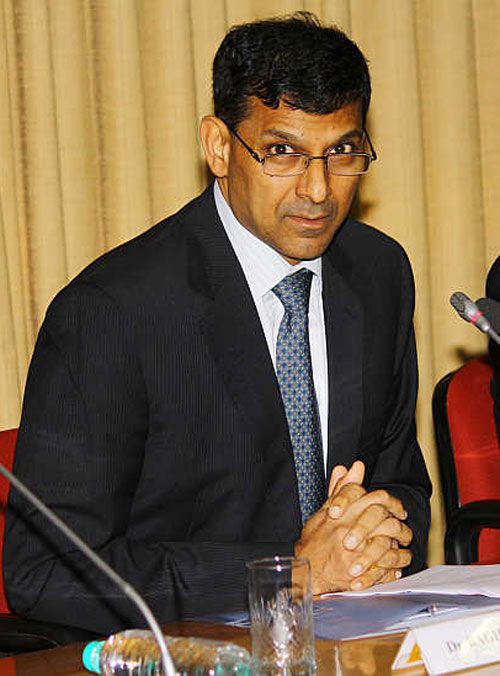
'Enterprises can fail, but people should not.'
Reserve Bank of India Governor Raghuram Rajan on Monday harped on the need for having a basic safety net in the country to encourage risk-taking abilities.
Basic health care, unemployment insurance and old age benefits should be part of the system, so that entrepreneurs get the impetus to start afresh if a business venture fails.
“Of course, as a poor country, we have to be careful of what we spend. . . .we should be careful that it is not a gold-plated safety net like the welfare scheme of the US,” Rajan said at the 27th Yashwantrao Chavan Memorial Lecture at Mantralaya, Maharashtra’s state secretariat.
Failure of business is not necessarily bad but continuing to put in resources for a sick unit is, he said and therefore, resources, including the manpower, should be quickly channelled to more productive enterprises.
“Enterprises can fail, but people should not.
"A firm, which is facing a failure shouldn’t be occupying resources,” he said.
“But, it should not be an unfair exit,” Rajan said, explaining creditors 'somewhat have draconian power' in the form of some lows that get activated swiftly when it comes to small firms but are quite powerless when a large corporation with access to more resources and lawyers challenge the power of banks.
“Small firms should not exit too fast, and large firms should not be allowed to last too long,” Rajan said in his speech.
Small firms that grow can only create jobs; therefore, the business environment should encourage firms to grow.
Rajan lauded the government’s Startup India initiative and said the government and RBI jointly are trying to create a level playing field with transparent, predictable and light regulations that would also protect property rights.
“RBI is trying to do much more on the web and trying to make regulations simpler,” he said.
“Anybody should be able to enter and compete and there should not be any special privilege for anyone,” Rajan said.
He cited the remarkable job done by Dalit entrepreneurs who particularly prospered in states where the business environment was friendly and open for everyone to compete.
With concerns being raised about cash-burn in the burgeoning e-commerce sector, the governor made it clear that getting revenues through deep discounting was not a viable business model for start-ups.
“If the only reason you are getting revenues, not profit, is because you are selling based on 50 per cent discount, it can't be viable in the long run,” he said.
He was quick to acknowledge that many businesses are in different stages of their life-cycle with some trying to establish the viability.
“All these businesses are trying to establish viability, some are still being financed in a big way,” he said, adding that it is natural for some of them not to work which will lead to shutting down the business.
Access to finance is one of the most crucial needs in the economy and the emergence of new-age banks and improving technology would be a 'game-changer,' he said, adding, under the new bank licence regime, four new banks have been given licences and 18 more would come in the next year.
Most of these banks would be knowing their customers intimately and therefore would supplement large banks who did not always have a lot of knowledge about their customers.
Creating unique identification numbers for small firms, based on the unique ID of the borrower, would make the loan process simpler and reliable for the lenders, he said.
On small finance banks, Rajan said, “My sense is, this is going to create a revolution in the banking sphere. And a revolution in the banking sphere will create easier access to finance for small entities.”
The governor said he expects each of these banks to start with a higher-than-required capital of Rs 500-600 crore (Rs 5-6 billion), which would entail having an asset book of up to Rs 6,000 crore (Rs 60 billion) and stressed that these won’t be “tiny banks”.
Addressing the bureaucrats, Rajan said, “One could, as senior officials, try to spend a day doing some task which they ask their assistants to do but without revealing who they are and getting the assistance.”
He wanted to introduce a similar system for senior officials at RBI as well.
This was in order to sensitise them to the travails of the 'Aam Aadmi' and help in better discharge of their duties.
Raghuram Rajan. Photograph: Hitesh Harisinghani/Rediff.com












 © 2025
© 2025